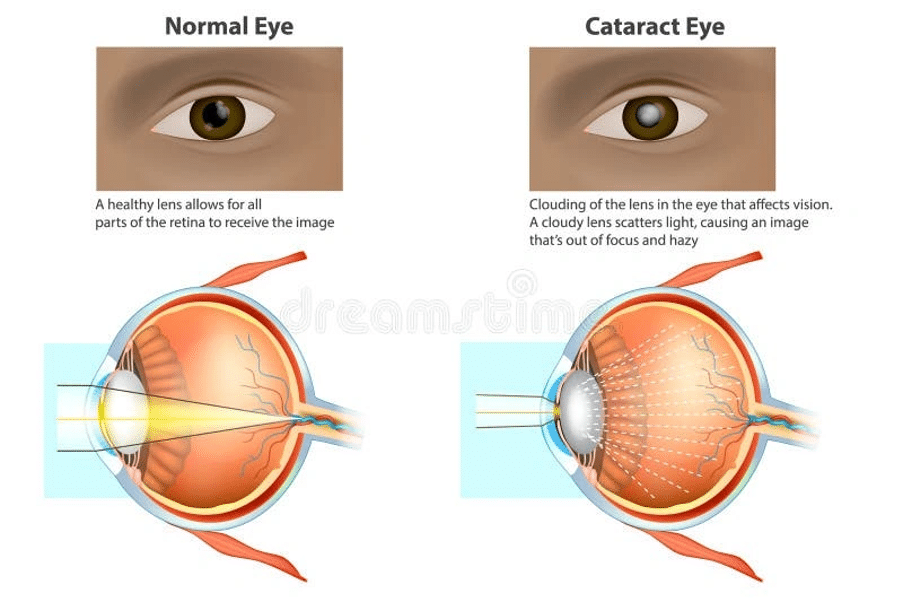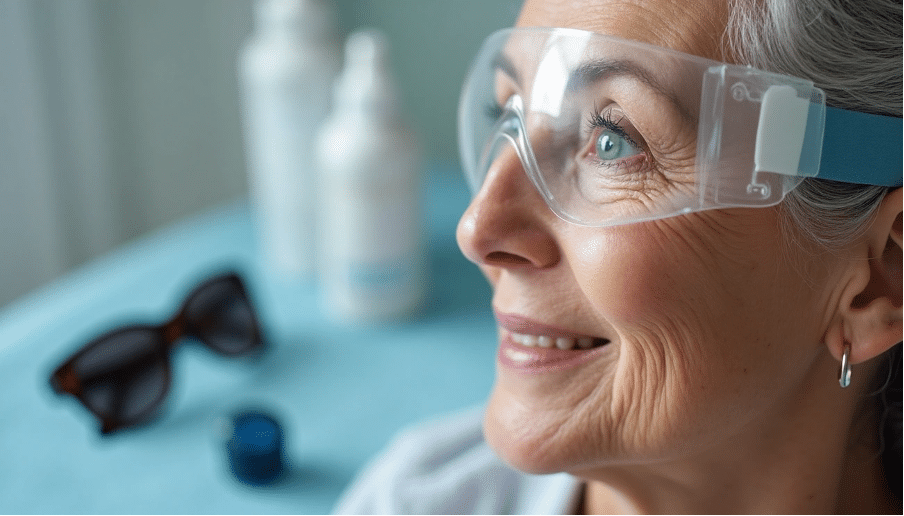Did you know that cataract surgery is one of the most common and successful procedures performed in the UK? Most people resume their normal activities within days or weeks after surgery, making recovery quicker than expected.
You might notice better vision within hours after your procedure. The complete healing process usually takes 2-6 weeks. Your eye may feel normal just 24 hours after surgery, but full recovery needs patience. Rest becomes crucial during the first two or three days after your operation, especially when you have to take things easy.
Cataract surgery improves your quality of life by a lot. Better vision lets you carry on with your daily activities smoothly. Questions about driving safely, returning to work, or doing household tasks might pop up in your mind. This piece guides you through your recovery timeline and provides clear schedules to safely return to your daily activities. The information helps you direct your cataract surgery recovery confidently, whether you’re getting ready for the procedure or already recovering.
Understanding the Healing Process
Your eye begins a vital healing experience after cataract surgery. The surgery might be quick, but your body needs time to adjust and recover completely.
What happens to the eye after surgery
Your eye starts healing right after the cloudy lens gets replaced with an artificial intraocular lens (IOL). The tiny incision from surgery begins to close as your eye adapts to the new lens. You might experience normal swelling that causes temporary blurry vision at first. The small nerves on your eye’s surface that were cut during the procedure will heal over approximately three months.

Image Source: Dreamstime.com
How long does it take to recover from a cataract operation
Vision improvements become noticeable within the first few days after surgery, though complete healing usually takes 4-6 weeks. Recovery times vary based on:
- Your age and overall health
- Your cataract’s severity
- Any pre-existing eye conditions
- The type of surgery performed
Some people’s vision stabilises within a week. Others might see subtle improvements in their vision over several months. Your follow-up appointments play a vital role in monitoring progress and ensuring proper healing.
Common symptoms during early recovery
Your eye will likely experience these normal symptoms during healing, including mild fluctuations in vision clarity and occasional discomfort. It’s essential to monitor these sensations and report any significant changes to your eye care professional. Staying patient and following post-operative care instructions will help ensure a smoother recovery process
- Blurry or foggy vision for a few days up to a week
- Mild discomfort, grittiness, or a scratchy sensation
- Watering or slight redness
- Light sensitivity
- A feeling that something is in your eye
These symptoms usually go away within days. You might notice floaters or halos around lights, especially at night. Your body’s natural healing response causes these effects, which typically disappear on their own. People with cornea disease such as Fuchs dystrophy might need longer—up to a month or more—for swelling to subside. Conditions like diabetes and dry eye can extend the healing process. Your eye might feel comfortable quickly, but internal healing continues for several weeks after the procedure.

When Can You Resume Daily Activities
Getting back to your daily routine after cataract surgery needs patience and good planning. Patients usually want to know the right time they can safely start their normal activities without risking their recovery.
How long after cataract surgery can you resume normal activities
Your eye starts healing right after surgery, and most people can read, watch TV, and write within three days. Most regular activities can start again after about three days. Your eye takes about a month to heal completely, so some restrictions will stay in place longer. Recovery times differ based on how well you heal, your age, general health, and how closely you follow post-surgery care instructions. Make sure to ask your ophthalmologist before starting any activity again.
What is considered strenuous activity after cataract surgery
Strenuous activities can raise blood pressure and put extra strain on your healing eye, so it’s best to avoid them early in recovery. It’s important to listen to your body and recognise any signs of discomfort or strain, as these can indicate that you need to take a step back. Gradually reintroducing activities while monitoring your eye’s response will help ensure a smoother recovery process.
. These activities include:
- Lifting heavy objects (anything over 10 pounds during the first week)
- Heavy exercise (running, weightlifting, tennis)
- Bending down for long periods
- Activities that might make you vomit or sneeze
These activities can increase pressure inside your eye—a common issue after cataract surgery—so you should avoid them for at least 2-4 weeks.
When you can return to housework and cooking
Light housework can start again within 24-48 hours. Heavier tasks like hoovering up, floor scrubbing, or carrying laundry baskets need to wait 2-4 weeks. Many surgeons suggest staying away from cooking for at least a week. Steam, heat, and cooking splatter could harm your healing eye. If you need to cook, protect your eyes with safety glasses.
When to resume reading, watching TV, and screen use
You can see after surgery, but limit your time with computers, mobile devices, and TV for 1-3 days. Light from these devices might strain your healing eye. After this period, slowly increase your screen time. Remember to keep good lighting and take breaks often to avoid tired eyes.
Driving, Work and Travel After Surgery
You need to carefully think about resuming activities like driving, returning to work, and travelling after cataract surgery. Your recovery experience has specific guidelines that help you manage these daily life activities. It’s essential to listen to your body and follow your surgeon’s advice to ensure a smooth recovery process.
How long after a cataract operation can you drive
Patients cannot drive right after surgery. Someone must take you home after the procedure. It’s important to have a trusted friend or family member assist you, as your vision may still be blurry and your depth perception could be affected. Your eyes need about three to four days to recover enough for driving.

When can you drive after cataract surgery
The DVLA vision requirements state you must read a number plate at 20.5 metres with both eyes open. Your consultant will check your vision during your post-operative appointment and tell you when you can safely drive again. Many patients face temporary light sensitivity and glare, which makes night driving difficult during early recovery.
Returning to work based on job type
Your job type determines when you can return to work. You can return the day after surgery if your job doesn’t have physical demands or exposure to dust, dirt, or wind. Jobs with physical demands need a longer recovery period.
Here are typical recovery timelines:
- Office work: 1-3 days
- Light physical work: 3-7 days
- Heavy manual labour: 2-4 weeks
Jobs with contact sports or physical restraint (such as martial arts instructors or police officers) need 2-4 weeks recovery. Your hospital doctor can provide documentation if your employer needs it.
Travelling and flying after surgery
The Civil Aviation Authority allows you to fly 24 hours after uncomplicated cataract surgery. You should still check with your doctor before booking any flights. These tips make air travel more comfortable:
- Keep lubricating eye drops handy for the dry cabin environment
- Review your travel insurance policy for surgery-related conditions
- Plan your travel around follow-up appointments
Flying won’t risk your recovery, but cabin conditions might worsen temporary dry eye symptoms that commonly occur after surgery.
Eye Care and Follow-Up Essentials
Your eye care plays a vital role during recovery from cataract surgery. Following these guidelines will help you heal better and avoid complications. It’s essential to attend all scheduled follow-up appointments, as your doctor will monitor your healing progress and adjust your treatment plan if necessary. Additionally, maintaining a healthy diet rich in vitamins A and C can support your eye health during this critical recovery phase.

Using eye drops and managing discomfort
You’ll receive prescription eye drops after surgery to prevent infection and reduce inflammation. Clean your hands before putting these drops in the treated eye, and start using them the morning after your procedure. Most patients need these drops for about 4 weeks.
The right way to put in drops:
- Clean your hands really well
- Look up toward the ceiling with your head tilted back
- Pull your lower lid down gently to create a pocket
- Put the prescribed drops in without letting the nozzle touch your eye
- Close your eye and blink a few times
Mild discomfort, grittiness, and watery eyes are normal during recovery. You can take over-the-counter painkillers like paracetamol and ibuprofen with your prescribed eye drops to feel better.
Protecting your eyes from irritants and sunlight
Your eye needs protection while it heals. A protective eye shield should be worn for at least a week after surgery, especially during sleep. This shield keeps you from rubbing your eye accidentally while sleeping. Sunglasses protect your eyes outdoors from wind, pollen and sunlight. Light sensitivity increases after surgery, so sunglasses become necessary every time you step outside.
Stay away from these irritants:
- Soap and shampoo (be careful washing your hair)
- Dust and airborne allergens
- Smoke
- Makeup particles
When to get new glasses or contact lenses
Let your vision stabilise before getting new glasses, which usually takes 4-6 weeks after surgery. Some experts say you might get new glasses after 2 weeks, but most eye care professionals suggest waiting at least 4 weeks.
Surgery on just one eye might require a contact lens for your other eye during this time. This temporary solution helps maintain balanced vision while your healing eye adjusts. It’s essential to follow your surgeon’s recommendations regarding the use of contact lenses to ensure optimal recovery.
Warning signs to contact your surgeon
Questions about your recovery? Our surgeons at Precision Vision London can give you personalised guidance to help you get back to your routine confidently.
Call your surgeon right away if you notice:
- Severe pain after surgery
- Swollen eyelids
- More redness than before
- Distorted vision or wavy lines
- Flashing lights or new floaters
- Vision that gets better then worse
These symptoms might indicate complications that need immediate medical care. It’s crucial to monitor your vision closely during the recovery phase and report any unusual changes to your surgeon. Early intervention can significantly improve outcomes and ensure a smoother healing process.
Conclusion
Final Thoughts on Your Cataract Surgery Recovery
Most patients experience a smooth recovery after cataract surgery. You’ll notice better vision within days after the procedure. Your eye might feel comfortable soon, but the internal healing continues for 4-6 weeks.
Your surgeon’s guidance plays a vital role in your recovery experience. Quick and successful healing depends on how well you follow post-operative instructions. Take your time to heal properly. Start with light tasks after a few days and move to more demanding activities after several weeks. Your recovery depends on proper eye protection and medication use. Prescribed eye drops help prevent infection and reduce inflammation. Protective eyewear guards your healing eye from irritants and bright sunlight.
Precision Vision London’s experienced surgeons create custom recovery timelines based on your needs. Our patients are amazed at how fast they resume daily activities with better vision and improved quality of life. Regular follow-up appointments help our specialists track your progress and tackle any concerns quickly.
Your body knows best how to heal. Each person’s recovery differs, so don’t compare yourself with others. Watch your gradual improvement and look forward to clearer vision ahead. Call our team right away if you notice any warning signs during recovery. We’re here to help and reassure you. Clear vision through cataract surgery brings a new perspective to your world. The temporary recovery restrictions are worth the lifelong benefits you’ll receive.
FAQs
Q1. How soon after cataract surgery can I resume my daily routine? Most people can return to light daily activities within 48 to 72 hours after surgery. However, it’s crucial to rest for the first two to three days and avoid strenuous activities. Full recovery typically takes about 4-6 weeks.
Q2. When is it safe to drive following cataract surgery? You can usually start driving again after 3-4 days, provided you meet the DVLA vision requirements. Your surgeon will assess your vision during your post-operative appointment and advise when it’s safe for you to drive.
Q3. How long should I use eye drops after the procedure? Most patients need to use prescribed eye drops for approximately 4 weeks after surgery. These drops help prevent infection and reduce inflammation. Always follow your surgeon’s specific instructions for application.
Q4. When can I get new glasses after cataract surgery? It’s best to wait until your vision has fully stabilised before getting new glasses, which is typically 4-6 weeks after surgery. Your eye care professional will advise you on the right time based on your individual recovery.
Q5. What warning signs should I look out for during recovery? Contact your surgeon immediately if you experience severe pain, increasing redness, swelling of the eyelids, distorted vision, flashing lights, new floaters, or vision that initially improves then worsens. These could indicate potential complications requiring prompt medical attention.
Authors & Reviewer
-
 Olivia: Author
Olivia: AuthorHi, I'm Olivia, a passionate writer specialising in eye care, vision health, and the latest advancements in optometry. I strive to craft informative and engaging articles that help readers make informed decisions about their eye health. With a keen eye for detail and a commitment to delivering accurate, research-backed content, I aim to educate and inspire through every piece I write.
-
 Dr. CT Pillai: Reviewer
Dr. CT Pillai: ReviewerDr. CT Pillai is a globally recognised ophthalmologist with over 30 years of experience, specialising in refractive surgery and general ophthalmology. Renowned for performing over 50,000 successful laser procedures.

